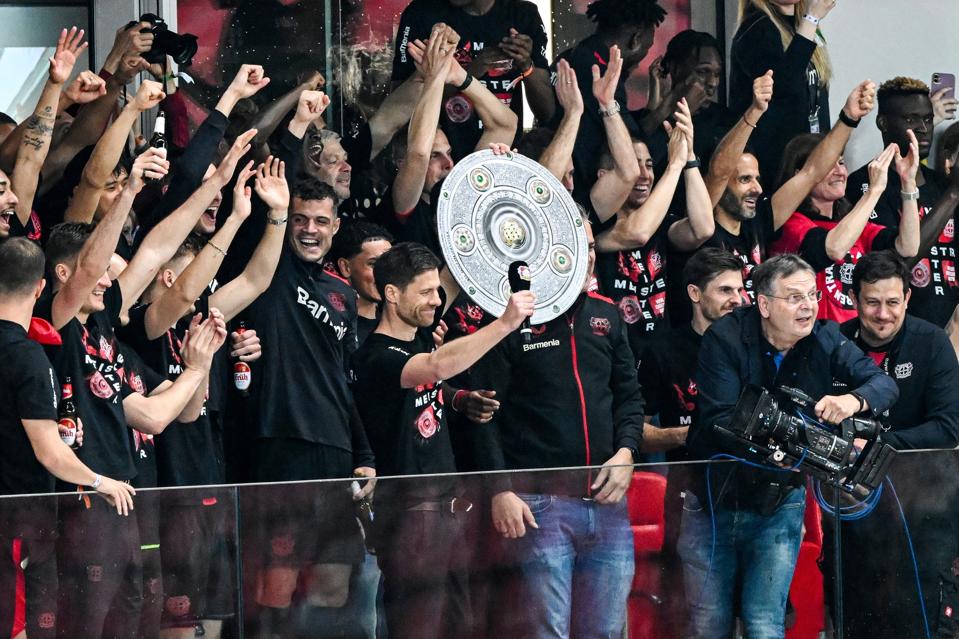After 4028 days, Bayern Munich’s dominance over the Bundesliga is over. On Sunday, Bayer Leverkusen wrapped up the club’s first Bundesliga title with a dominant 5-0 win over Werder Bremen. Like much of the season, this game wasn’t much of a contest.
Leverkusen took the lead in the 25th minute when Victor Boniface converted a spot kick after Jonas Hofmann was brought down inside the box. Until that moment, the game was a bit cagey, but after Leverkusen took the lead, there seemed to be no doubt that Die Werkself was going to wrap up the title with five games to go.
That certainty became even more profound when Granit Xhaka doubled the lead with a shot the clocked 107km/h (60’), and then Florian Wirtz made it 3-0 with another brilliant long-range effort eight minutes later. Indeed, that goal opened the floodgates as fans rushed to the edge of the pitch and onto the pitch to celebrate Wirtz’s second (83’) and third goal (90’).
Moments after Wirtz made it 5-0 and with fans already on the pitch, referee Harm Osmers ended the game, handing over the spectacle to the fans. Indeed, it appeared that not a single one of the 30,210 spectators was still in the stands but instead had rushed onto the pitch to celebrate with the fans.
Pitch invasions are common in German football. But with Bayern holding a stranglehold over the Meisterschale, they have been reserved for promotion parties or teams fighting off relegation over the last 11 years.
In fact, this might have been the most emotional title celebration in German football since Borussia Dortmund won its first title in 1995 after a 32-year wait or under Jürgen Klopp in 2011 and 2012. The latter two were also the last two times since a club not named Bayern has won the Bundesliga.
With that in mind, Leverkusen’s championship is a watershed moment—perhaps even crucial for the Bundesliga in a year in which it is negotiating a new national television deal. The financial implications could be massive for a league that wants to avoid a similar scenario as LaLiga, Ligue 1, or Serie A, where television revenue has not just stagnated but shrunk.
Leverkusen’s title win, however, isn’t just important from a financial perspective. It also has the potential to shake up a German football scene that seemed to be not just stuck but going backward.
Once a trendsetter, the Bundesliga needs to innovate to catch up to the Premier League and Serie A. The national team has struggled since winning the FIFA Confederations Cup in 2017. But thanks to Leverkusen sporting director Simon Rolfes and head coach Xabi Alonso, there is now a sense of renewal.
Rolfes’s idea of appointing Xabi Alonso, in particular, has been a jackpot. While the Spaniard rightfully receives praise for how Leverkusen has played, Rolfes is the true architect of this Leverkusen side. The 42-year-old brought on all the players and replaced Gerardo Seoane with Alonso.
That decision would ultimately lead to the club’s first Bundesliga title and perhaps more, as Leverkusen is also in the DFB Pokal final and can still win the Europa League. Alonso has brought a style of football to the Bundesliga not seen since Pep Guardiola oversaw Bayern from 2013 to 2016.
Under Alonso, Leverkusen has been playing primarily dominant possession-style football throwing out the idea of Gegenpressing that saw Dortmund break Bayern’s dominance in 2011 and 2012. But Leverkusen isn’t just a passing machine. Alonso was happy to surrender the ball against Bayern, showing a tactical flexibility that has been increasingly uncommon in German football.
The Spaniard isn’t the only one with this approach. Stuttgart, under Sebastian Hoeneß, has also played a remarkable season with a very similar tactic. But winning the title means that not just the rest of the league but beyond has taken note. National team head coach Julian Nagelsmann has recently earned two dominant wins, pretty much playing the same football as Alonso.
Off the pitch, more and more clubs now realize that there is a way to beat Bayern. “Leverkusen shows what is possible,” RB Leipzig sporting director Rouven Schröder recently said to the German magazine Kicker.
Short-term the end of Bayern’s dominance will be the legacy of Leverkusen’s first ever Bundesliga title. Long-term it might lead to a more competitive league not seen since the 1990s, and the Rekordmeister not only seems vulnerable but also because Alonso is here to stay for at least one more year, perhaps even longer.
Indeed, Alonso’s decision to remain in Leverkusen also means that almost all the key players will stay at the club. First and foremost, Florian Wirtz, whose father recently underlined that his son will remain at the club at least until 2026. In fact, other than Jeremie Frimpong, who has an exit clause, all other players are under long-term contracts—another example of Rolfe’s excellent planning.
With that in mind, Leverkusen will be the favorite to win the title again next season. Bayern will challenge them. But the Munich giants won’t be alone in winning the title; whether it is RB Leipzig, Stuttgart, Frankfurt, or Dortmund, many clubs will try to emulate the Leverkusen way. And that is good news for the Bundesliga overall.
Manuel Veth is the host of the Bundesliga Gegenpressing Podcast and the Area Manager USA at Transfermarkt. He has also been published in the Guardian, Newsweek, Howler, Pro Soccer USA, and several other outlets. Follow him on Twitter: @ManuelVeth and on Threads: @manuveth

